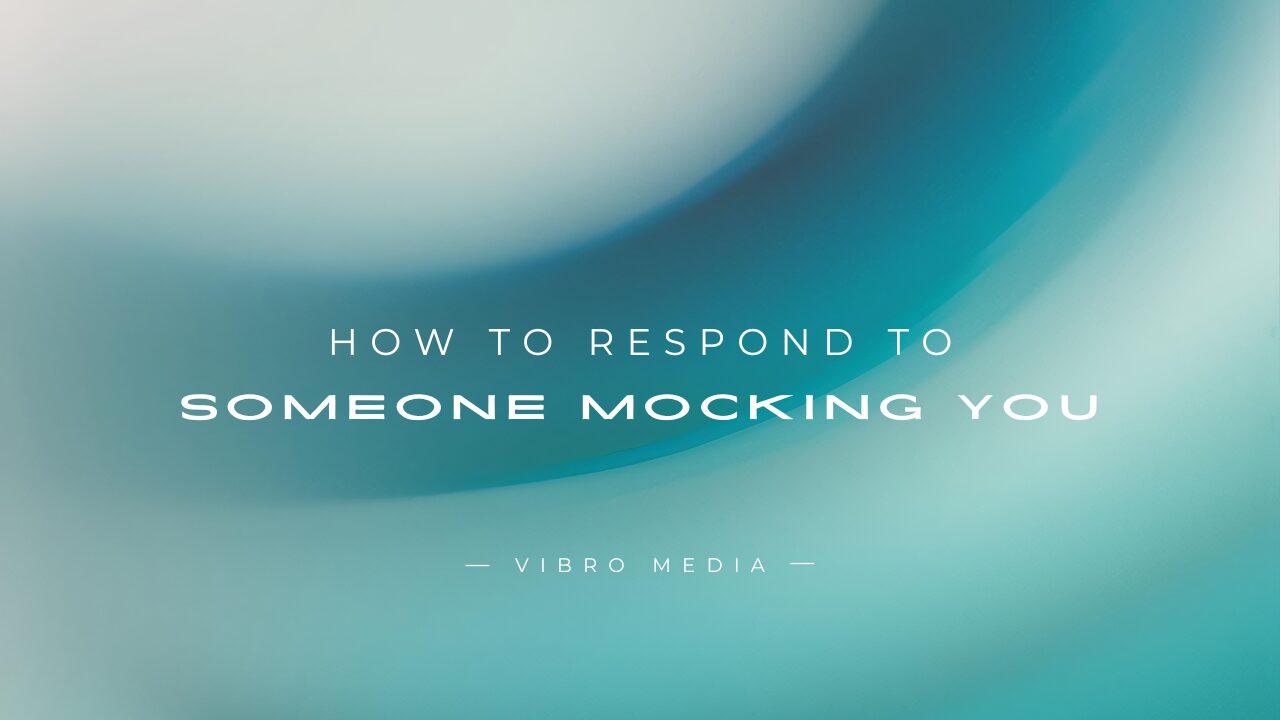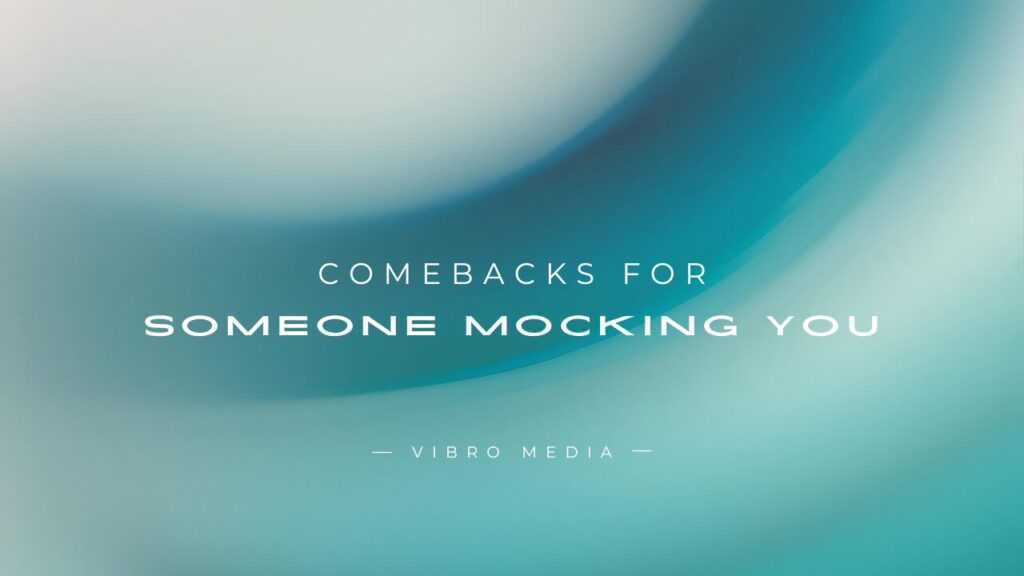How to Respond to Someone Mocking You : 200+ Comebacks

We’ve all faced it at some point: someone mocking you, whether in a social setting, at work, or even online. It’s never pleasant, and it can sting. However, addressing mockery effectively is crucial for maintaining peace of mind and self-respect. This article will explain mockery, why it happens, and how to handle it like a pro.
Understanding Mockery
- Definition of Mockery
Mockery is more than just teasing; it’s a ridicule designed to belittle or demean someone. It often involves sarcastic remarks or gestures intended to make the target feel inadequate or foolish.
- Psychological Impact of Mockery
The impact of mockery can be profound. It often triggers feelings of shame, embarrassment, and inadequacy. Over time, repeated mockery can lead to decreased self-esteem and even depression. Understanding this impact is the first step in coping with it effectively.
Why People Mock Others
- Insecurity and Self-Esteem Issues
One of the most common reasons people mock others is their insecurity. They may use mockery to deflect attention from their shortcomings or to elevate themselves by putting others down.
- Seeking Attention or Validation
Sometimes, mockery is a way for people to gain attention or validation from others. By mocking someone, they might be trying to fit in with a group or prove their worth.
- Social Dynamics and Group Behavior
In group settings, mockery can become a social tool. It can serve as a way to establish dominance or bond with others through shared laughter at someone else’s expense.

200+ Comebacks for “Someone Mocking You”
Humorous
- I’m not arguing with you. I’m just explaining why I’m right.
- You should try a career in comedy. Oh wait, you already do it for free!
- Is that your best shot? I’ve seen better jokes in my grandma’s knitting club.
- If laughter is the best medicine, your jokes must cure boredom.
- Wow, that was funny. It’s almost as funny as my last bad haircut.
- Is that your default setting for conversation, or are you just having an off day?
- I’d explain why your joke wasn’t funny, but I’d rather save my breath for better things.
- I’m glad you’re laughing. It’s always nice to see someone with a sense of humour—even if it’s at my expense.
- Your jokes are like boomerangs; they come back to you with the same level of fun.
- Nice one! Let’s see if you can top that with something even more creative.
Confident
- I know who I am, and your opinion doesn’t change that.
- Your mockery only highlights how confident I am in myself.
- I’m not here to please everyone. I’m here to be me, and that’s enough.
- I appreciate your feedback, but I’m perfectly fine as I am.
- What you say about me says more about you than it does about me.
- My skin is secure, so your mockery doesn’t affect me.
- Your opinion is noted, but it’s unnecessary to validate my worth.
- I have better things to focus on than letting your comments bother me.
- I’m not interested in competing with you for validation. I’m already confident in who I am.
- Your comments are a reflection of your insecurities, not my shortcomings.
Sarcastic
- Oh, brilliant observation. I’ll add it to my list of things I didn’t ask for.
- Wow, you’re a real expert in being unimpressive. How do you do it?
- Thanks for that. I didn’t realise I needed your approval to be myself.
- Oh, I see. You’re here to offer unsolicited advice and critique. How original.
- I didn’t realise my life needed your commentary to be meaningful. Thanks for that.
- Well, that was an insightful critique. I’ll be sure to consider it when seeking validation from random strangers.
- I’d still be broke if I had a nickel for every time I needed your opinion.
- I’m glad you’re here to share your wisdom. I was starting to feel too good about myself.
- Your comments are as useful as a screen door on a submarine.
- Oh, I didn’t catch that. Could you repeat it with less sarcasm this time?
Straightforward
- I don’t find that comment helpful. Can we move on?
- I’m not interested in engaging with negativity. Let’s keep this positive.
- I see you’re trying to be funny, but it’s not working for me.
- I’d rather focus on constructive conversations rather than mockery.
- If you have something to say, make it meaningful. Otherwise, let’s not waste time.
- Your comment isn’t adding to the discussion. How about we change the topic?
- I’m here to have a good time, not to be ridiculed. Can we keep it respectful?
- Let’s stick to talking about things that matter rather than making jokes at my expense.
- I don’t appreciate being mocked. If you want to talk, let’s do it respectfully.
- That’s not a comment I need to hear right now. Let’s keep it professional.
Playful
- Oh, I see you’re in the mood for jokes today! What else do you have up your sleeve?
- If mocking was an Olympic sport, I’d say you’re going for gold!
- Well, aren’t you a bundle of laughs? Let’s see if you can keep up with my humour!
- Is this your idea of a good time? Because I’m entertained.
- Careful, or you’ll make me laugh so hard I’ll start mocking you right back!
- You’ve got jokes! Now, let’s see if you can develop something even more clever.
- I didn’t know I was the star of your comedy show. What’s next on the agenda?
- If you keep this up, I might enrol you in a stand-up class!
- I’m impressed! You’re committed to this joke. What’s your next act?
- Nice one! You should be a comedian. Maybe I’ll be your first fan!
Empowering
- Your words don’t define my worth. I’m confident in who I am.
- I’m proud of who I am and not letting negativity affect me.
- Mockery doesn’t change my values or my path. I’m here to succeed regardless.
- Your opinion is just noise compared to my self-belief and strength.
- I’m focused on my goals and won’t be derailed by mockery.
- I rise above negativity and stay true to my values and aspirations.
- Your comments are a reminder of why I need to keep pushing forward.
- I believe in myself and my journey, and no amount of mockery will change that.
- My confidence empowers me, and I won’t let negativity hold me back.
- Your attempt to mock me only fuels my determination to prove myself even more.
Intelligent
- It’s interesting how your comments focus more on me than anything constructive.
- I’m curious: how does mocking others contribute to your personal growth?
- I’d rather engage in discussions that challenge the mind rather than indulge in mockery.
- Your insight into my life is impressive, though I’d prefer more evidence before we continue.
- Intelligence often shines through in thoughtful conversation rather than ridicule.
- Mockery may be easy, but meaningful dialogue requires deeper thought.
- You have a unique perspective, though I’d be more intrigued by a thoughtful discussion.
- It’s fascinating how some people use their intellect for mockery rather than enlightenment.
- If only we could channel our cleverness into something more beneficial than sarcasm.
- Your comment is noted, but I’d rather focus on intelligent and constructive exchanges.
Deflective
- Let’s talk about something more productive. What’s new with you?
- I’m more interested in hearing about your latest project. How’s that going?
- Instead of focusing on me, why don’t we discuss something you’re passionate about?
- I appreciate your input, but shift the conversation to something more engaging.
- Let’s redirect this discussion. I’m curious about your thoughts on a different topic.
- Why not share something positive or interesting instead of mockery?
- I’m not here to be the centre of ridicule. What’s something exciting happening in your life?
- How about we focus on a new topic? I’m interested in hearing about your recent achievements.
- Let’s save the mockery for another time and discuss something that benefits both of us.
- I’d rather not dwell on this. What’s something fun or inspiring you’ve been working on?
Reflective
- Intriguingly, you feel the need to mock. What does that say about how you view yourself?
- What might be behind your need to ridicule others? Is everything okay on your end?
- Reflecting on your comments, I wonder if this is how you usually engage with people.
- Your mockery might reveal more about your insecurities than about me.
- It’s worth considering what motivates us to make fun of others. What do you think drives that?
- I’m curious if you use this mocking approach often. How does it affect your relationships?
- Sometimes, our reactions to others can reflect our internal struggles. What’s your take on that?
- It’s interesting to reflect on why we sometimes resort to mockery. What’s your perspective on this?
- Your comments might be a reflection of how you handle your challenges. How do you feel about that?
- Considering the nature of your mockery, reflecting on what you’re trying to achieve might be useful.
Gracious
- I appreciate your feedback, but I’m doing just fine.
- Thank you for sharing your thoughts. I’ll keep that in mind.
- I’m glad you’re expressing yourself. Let’s focus on making this a positive interaction.
- It’s kind of you to voice your opinion. I choose to stay positive regardless.
- I respect your right to your opinion, even if I don’t agree with it.
- I appreciate your concern, though I’m content with who I am.
- Thanks for your input. I hope we find common ground on something we both enjoy.
- Your perspective is noted. I prefer to focus on the positive aspects of life.
- I’m grateful for your honesty. Let’s work towards a more supportive conversation.
- I value your thoughts and hope we can continue this discussion with mutual respect.
Witty
- If I had a dollar for every time I heard something like that, I’d be on vacation right now.
- I’d love to stay and chat, but I have a meeting with my awesomeness.
- Your sense of humour is impressive. It must be an art form to be that consistently off-target.
- I’m flattered that you’ve made me the focus of your attention. I’m sure it’s a compliment in disguise.
- Ah, I see you’re a fan of my life story. It’s a best-seller in the ‘Not Bothered’ genre.
- That’s a good one! I haven’t heard such originality since last Tuesday.
- I see we’re competing in the ‘Most Creative Mockery’ contest. Keep going; you’re doing great!
- I appreciate your effort in keeping things interesting. It’s like having my comedy show.
- If it were a competition, you’d win first place for persistence.
- Your attempt at mockery is almost as impressive as your commitment to being unoriginal.
Philosophical
- Mockery often reveals more about the one who mocks than the one being mocked.
- Sometimes, the things we laugh at reflect deeper truths we avoid facing.
- In the grand scheme of life, our mockery moments are fleeting shadows against the light of our true selves.
- The essence of our being is not defined by others’ judgments but by our understanding and acceptance.
- Perhaps mockery is a way of grappling with one’s sense of inadequacy or fear.
- What we choose to focus on often reveals our inner state. Let’s aim for a higher perspective.
- In life’s journey, how we respond to mockery often defines our growth more than the mockery itself.
- Every act of ridicule is a chance to reflect on what truly matters and how we choose to rise above.
- The deeper philosophical question is: why does mockery exist, and what does it teach us about ourselves?
- Our reactions to mockery can be a mirror, showing us our strength and the nature of human interaction.
Cultural References
- It looks like you’re channelling your inner stand-up comedian. Maybe you should audition for America’s Got Talent.
- Your comments are reminiscent of the classic sitcoms where the characters are all about quick jabs. How’s that working out for you?
- Is this your version of an Oscar-winning performance in the ‘Mockery’ category? Quite the role!
- Are you trying to be the next Jon Stewart, or is this just an amateur hour?
- You must do better if you aim for a Game of Thrones drama style.
- I see you’ve been watching a lot of reality TV. Your mockery fits right in!
- This feels like a scene from a Friends episode where someone’s always the punchline. Classic!
- I didn’t realise I was in The Office. Your sarcastic remarks are almost as funny as Michael Scott’s.
- Is this your tribute to the Saturday Night Live skits? You’re almost there!
- It’s like you’re auditioning for Whose Line Is It Anyway? with those quick quips. Keep at it!
Playfully Self-Deprecating
- You’ve noticed my unique way of being the centre of attention. I’ve been perfecting it for years!
- You’re right; my sense of humour is rusty, just like my cooking skills.
- Well, I’m just a masterpiece of imperfections. Thanks for pointing out the details!
- It’s true; I’m a work in progress. Everyone’s a critic, right?
- I guess I’m not winning any awards for my sense of style. It’s a good thing I don’t need a trophy!
- You’re spot-on; I’m clumsy as a bull in a china shop. But that’s what makes life interesting!
- I’m pretty good at being the butt of jokes. I’ve had plenty of practice!
- I’m sure my awkwardness only matches my ability to laugh at myself. Thanks for the reminder!
- You’re right—my dance moves are as offbeat as my sense of humour. Classic me!
- I’m like a walking punchline, always ready for the next joke. Thanks for keeping the tradition alive!
Sincere
- I understand that we all have different ways of expressing ourselves. I hope we find common ground.
- Your comment may have been a joke, but I’d rather focus on positive interactions.
- I see where you’re coming from, though I’d appreciate a more supportive approach.
- It’s important to me that we treat each other with kindness. Let’s try to keep our interactions respectful.
- I know you might not mean any harm, but I’d prefer if we could speak to each other with more understanding.
- I value honest communication, but I hope we can find a way to express ourselves without mockery.
- I respect your opinion, even if it’s not what I’d hoped for. Let’s aim for a more empathetic dialogue.
- I understand that not everyone sees things the same way, but I hope we can maintain a positive tone.
- Your perspective is clear, though a kinder approach would be more constructive for both of us.
- Having differing views is okay, but we should address each other with compassion and respect.
Mystical or Metaphorical
- In the grand tapestry of life, your mockery is but a single thread—let’s weave something more meaningful.
- Mockery is like a fleeting shadow; it may darken the moment, but it never changes the light of who I am.
- Just as the moon reflects the sun’s light, your comments reflect your inner struggles rather than my reality.
- We are all travellers on a journey, and sometimes mockery is merely a bump in the road we pass by.
- Your words are like ripples in a pond—momentary and soon lost in the depth of my serenity.
- Like clouds passing through the sky, your mockery is just a temporary obscuration of the bright light within.
- In the cosmic dance of existence, every jest is a mere twirl in the grand ballet of our lives.
- Mockery is like a storm cloud; it may obscure the sun temporarily, but it doesn’t alter the brilliance of the day.
- Our lives are like rivers flowing to the sea—mockery is merely a pebble that disrupts the current momentarily.
- Your comments are like fleeting winds—disruptive but soon forgotten as I sail toward my destination.
Over-the-Top
- Oh, marvellous! Your mockery is like a Broadway production—complete with dramatic flair and zero substance!
- If you aimed to outdo Shakespeare in a tragedy of mockery, congratulations, you’ve achieved it!
- Your comment is so over the top that it deserves a standing ovation for its sheer audacity!
- Wow, with that level of mockery, you’re practically the star of your soap opera!
- I’m impressed! Your attempt at mockery is so glorious it could rival a Hollywood blockbuster.
- If mocking were an art form, you’d be the Michelangelo of over-the-top performances!
- Your comments are like an epic saga—long, dramatic, and completely unnecessary.
- Oh, such flair! Your mockery deserves its reality show for its sheer dramatic effect.
- Bravo! Your mockery has reached a level of theatricality that could only be matched by a Shakespearean play.
- You’ve turned mockery into an art form! I’m almost expecting a curtain call after your performance.
Nonchalant
- Oh, that’s nice. I guess I’ll just keep doing my thing.
- Cool story. I’m going to keep focusing on what matters to me.
- Thanks for the input. I’ll just keep moving forward.
- That’s interesting. I’ll be over here, not letting it bother me.
- Sure, if that’s what you need to do. I’ve got other things to think about.
- Alright then. I’ll carry on with my day as planned.
- Oh, really? I’m not too concerned with that.
- I got it. I’m going to keep on with what I’m doing.
- Well, if that’s your take, I’m fine with it. I’ve got bigger things to handle.
- Noted. I’ll just continue on my path without giving it much thought.
Inquisitive
- I’m curious—what’s motivating you to focus so much on mocking me instead of contributing something positive?
- Is there a reason you feel the need to make fun of me? What’s your goal here?
- Please help me understand why you think mocking me is best for your time.
- I’d like to know—what’s behind the need to ridicule others? Is there something you’re dealing with?
- What do you hope to achieve with these comments? Are you looking for a reaction or something else?
- I’m wondering what drives you to mock people. Is it something you’ve seen or experienced before?
- What makes you think that mockery is an effective way to communicate?
- I’m interested in understanding your perspective. What’s the purpose of your comments?
- What does mocking me say about your own experiences? Is there a deeper reason for this behaviour?
- What do you hope to gain from this exchange? Is there something specific you’re trying to accomplish?
Historical or Literary
- Your mockery is reminiscent of the jests in Shakespeare’s comedies—humorous but ultimately inconsequential.
- Much like the jabs in a Dickens novel, your comments are colourful but don’t truly affect the narrative of my life.
- This reminds me of the satirical critiques in Candide. Let’s aim for a more enlightened discussion.
- In the grand scheme of history, mockery often fades away, much like the trivial grievances of bygone eras.
- Your comments are like a dramatic Greek play scene but ultimately a side plot in the larger story.
- Much like the critics in The Canterbury Tales, your remarks are entertaining but don’t change the course of my journey.
- Your mockery is akin to the barbs exchanged in a Shakespearean duel—entertaining but ultimately inconsequential.
- This situation feels like something out of Pride and Prejudice—your comments add drama but not much else.
- In the annals of literature, characters who mock often reveal more about their insecurities than those they target.
- Your remarks remind me of the witty exchanges in The Importance of Being Earnest—amusing but not particularly impactful.
Immediate Reactions to Mockery
- Emotional Responses
When mocked, your initial reaction might be anger, sadness, or confusion. It’s important to acknowledge these feelings but not let them dictate your response.
- Common Reactions and Pitfalls
People often react impulsively to mockery, leading to arguments or escalation. Common pitfalls include shouting back, becoming defensive, or taking the mockery too personally.
Strategies to Handle Mockery
Stay Calm and Composed
- Importance of Keeping Your Cool
Remaining calm when someone mocks you is crucial. It helps you maintain control of the situation and demonstrates that their attempts to provoke you are ineffective.
- Techniques for Maintaining Composure
Deep breathing, counting to ten, or silently repeating a calming mantra can help you stay calm. Practising mindfulness and staying focused on your responses rather than your emotions can also be beneficial.
Respond with Confidence
- Crafting Assertive Responses
A confident response is key. Rather than reacting emotionally, address the mockery with assertiveness. For example, you might say, “I don’t find that funny,” or “I’d appreciate it if you spoke to me respectfully.”
- Examples of Effective Responses
“I understand you’re trying to joke, but that comment was hurtful.” This response communicates your feelings without escalating the situation.
Ignore and Walk Away
- When Ignoring Is Effective
Sometimes, the best response is no response. Ignoring mockery can be effective when you recognise that engaging would only escalate the situation or when the mockery is from someone seeking attention.
- How to Disengage Politely
You can politely excuse yourself from the conversation by saying, “I’m not interested in continuing this discussion.” Walking away gracefully can often be the most dignified choice.
Use Humor to Deflect
- The Power of Laughing It Off
Using humour to deflect mockery can be a powerful tool. It shows that you’re unphased and can even turn the situation around. Just be sure the humour doesn’t come off as sarcasm or passive aggression.
- Appropriate Use of Humor
A well-timed joke or light-hearted comment can neutralise the situation. For instance, if someone mocks your new haircut, you might say, “I guess it’s so bold it’s catching everyone’s attention!”
Seek Support from Others
- Talking to Friends and Family
Sometimes, it helps to talk to someone you trust about the experience. Friends and family can provide perspective and support, helping you feel less isolated.
- When to Seek Professional Help
If mockery is affecting your mental health or if you’re dealing with persistent bullying, seeking help from a counsellor or therapist might be necessary. They can provide strategies to cope and build resilience.
Long-Term Strategies for Dealing with Mockery
Building Self-Esteem and Confidence
- Techniques for Self-Improvement
Working on your self-esteem and confidence can make you less vulnerable to mockery. Techniques include setting and achieving personal goals, practising self-compassion, and engaging in activities that boost your self-worth.
- Resources for Building Confidence
Many resources are available, from self-help books to workshops and online courses. Investing time in building your confidence can pay off in handling mockery.
Developing Emotional Resilience
- Practices to Strengthen Emotional Health
Emotional resilience helps you bounce back from setbacks. Practices like mindfulness, meditation, and journaling can help build this resilience.
- Benefits of Emotional Resilience
Resilient individuals are better equipped to handle mockery and other challenges without letting them undermine their self-esteem or well-being.
Improving Communication Skills
- Effective Communication Techniques
Improving your communication skills can help you respond to mockery more effectively. Techniques include active listening, clear expression of your thoughts, and managing non-verbal cues.
- Role of Communication in Handling Mockery
Effective communication can help you assert yourself and address mockery constructively, reducing the likelihood of future occurrences.
When Mockery Becomes Bullying
- Recognising the Signs of Bullying
If mockery turns into repeated, targeted behaviour intended to harm or intimidate, it may become bullying. Recognise signs such as persistent teasing, exclusion, or threats.
- Steps to Take if You’re Being Bullied
If you’re experiencing bullying, document the incidents, report them to appropriate authorities or HR, and seek support from trusted individuals or professionals.
Personal Stories and Anecdotes
- Real-Life Examples of Handling Mockery
Hearing how others have successfully dealt with mockery can be inspiring. For instance, a professional might share how they addressed office mockery by calmly setting boundaries, which improved their work environment.
- Lessons Learned from Personal Experiences
Personal experiences often reveal valuable lessons. Reflecting on how you’ve handled mockery in the past can provide insights and strategies for future situations.
Conclusion
In conclusion, facing someone mocking you can be challenging, but with the right approach, you can turn the situation to your advantage. Our collection of over 200 comebacks offers a variety of clever and assertive responses to help you address ridicule with confidence. Remember, handling mockery effectively is about maintaining your composure and responding in a way that preserves your dignity. For more strategies for dealing with difficult interactions,
check out our guide on:
How to Shut Down “Nosy People”: 200+ Best Comebacks.
FAQs
Q. How can I respond if someone mocks me in a professional setting?
In a professional setting, it’s important to remain calm and address the situation assertively. For example, you say, “I prefer to keep discussions respectful,” and report the behaviour to HR if necessary.
Q. What if ignoring the mockery makes it worse?
If ignoring the mockery escalates the situation, consider addressing it directly but calmly. Explain how the comments make you feel and request that they stop.
Q. Can mockery be a sign of deeper issues in a relationship?
Yes, mockery can sometimes indicate deeper issues, such as unresolved conflicts or underlying insecurities. It’s important to address these issues directly to improve the relationship.
Q. How do I help someone who is being mocked?
Support the person by listening to them, offering empathy, and helping them develop strategies to handle the mockery. It is also beneficial to encourage them to seek professional support if needed.
Q. What are the best ways to build self-esteem and better handle mockery?
Building self-esteem involves setting personal goals, engaging in self-care, surrounding yourself with supportive people, and practising self-compassion. Consider seeking resources or professional guidance to further develop your confidence.






